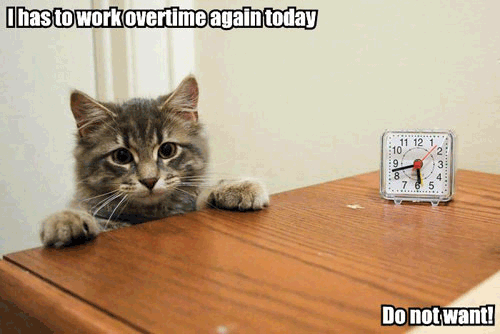How to Have a Good Work/Life (or Work/Write) Balance
Shifting to a healthy work/life balance doesn't mean your output will be any less. If anything, you'll became more efficient and motivated.
A lot of us writers have full-time jobs. Some of us haven't closed any book deals yet, and even after we do (#wishfulthinking), most of us still need to hold down day jobs to maintain our lifestyles. We rely on the few measly hours we have after work to write, see friends, run errands, take care of family, shop, read, watch TV, or do whatever it is we enjoy doing.
But in the digital age, it's hard not to be tuned into work 24/7. You're pressured to work constantly, even after you've left the office, since it's so easy to stay connected via mobile. Long gone are the days of 9-5. Or so you're led to believe.
The truth is, work/life balance is what you make of it. You're in control of your own actions and how much you work. You might feel that you've lost control. You might feel that if you aren't always dialed in, the walls will collapse without you there to hold them up. I was there, I know.
But then I changed. I realized that the years aren't going to slow down and wait for me to find time to write a novel. I needed to take control of my work/life balance. Really, I needed to take my life back.
And I did.
The thing is, shifting to a healthy work/life balance didn't mean my output was any less. If anything, I became more efficient and motivated while at work, because I started each day refreshed and ready to start working. And during my free time, I wrote a novel.
So I want to share a few tips on how you can have a good work/life balance (or for those of you authors, a good work/write balance). If you follow each of these tips, your life will change. Trust me.
1. Take your work email off your phone
Wait, you thought these tips would be easy? Nope, I'm not a fan of weaning off of things. If you want to take control of your life, dramatic action is necessary. It might be painful, but you MUST remove your work email from your phone.
I used to wake up in the morning and the first thing I'd do is reach for my phone to check my work email. And of course, I'd see something that would stress me out immediately. What a horrible way to start the day! Or I'd go out to dinner with my husband, and my phone would trill every two minutes -- and of course, I'd feel the urge to check. You know how it is; I don't need to provide more examples.
End your slavery to your phone. Remove your work email, both from the main mail app and from any of your browser tabs.
2. Only use your work laptop to do work stuff
Similarly, remove your work email/portals/VPNs/etc. from your personal laptop at home. If you ever need to work from home, take home your work laptop. Create a divide between your work life and personal life. Clean out your history, caches, and saved passwords if that will make it less tempting to check in from your home computer.
I went so far as to buy myself a new work laptop. I got a Macbook Air, and I justified the cost by promising myself that I would write my first novel on it within a few months, and that I would never, ever check my work email on it. I kept both of those promises.
3. Only check into work AT work
Don't check your work email at home unless you are working from home that day. If you work from home, set a specific time for you to close your work laptop. If you have extra work to do that day, and everyone on your team is hustling and putting in extra time, stay at the office. Do not bring your work home unless you absolutely can't help it, and those instances should be exceptions rather than rules.
4. Leave when you're done
Don't force yourself to stay until 6 or 7 or whenever it is you think you're expected to stay at work. That's ridiculous. You'll probably spend the last 1/2 hour after you've finished your work browsing Facebook and staring at the clock, anyway. If you've finished a project at 5:30, leave. Seriously. Just leave. How much of your next project would you have gotten done in 30 minutes, anyway? Instead, leave, go home, and enjoy your evening either relaxing or working on your own personal projects. Then you'll come into the office the next day refreshed and ready to go.
Pro tip: Don't feel guilty when you see that most of your coworkers are still sticking around after six. That probably just means they're less efficient during the day. If you know you're doing your job well, and you're getting a lot done during the day, do not succumb to the guilt in your own brain. Take charge and leave.
4. Make the most of your time at work
Now that we've established that you're only allowed to work at work, and keep reasonable hours, you must make the most of those hours. Don't check Facebook every two seconds. Don't yield to the Buzzfeed temptation. Get in the zone and stay there for as long as you can. Don't take super-long lunch breaks, and eat at your desk when you can, but don't be antisocial either.
5. Avoid corporate chat (Slack, Discord, etc.)
Avoid chat unless you are talking about work projects. If someone IMs you and tries to gossip or vent, ignore it or set your "Do not disturb" or "Away" message, or politely say "I'm sorry, I'm SO busy right now. Let's grab coffee for 15 minutes later so we can chat about it." It takes longer to type out advice than it does to say it in person.
6. Buy great headphones
Invest in some noise-canceling headphones if you can. Not only do they block out noise and help you concentrate, but they dissuade people from bothering you when they see you're in the zone with your headphones on. Keeping your headphones off is basically an invitation for people to bug you about something.
7. Turn off email alerts
In case you haven't caught on by now, email is the plague. If you are in the middle of a project, only check your work email every hour or every other hour. I have a HARD time with this, but when I minimize my browser with my work email, I get SO MUCH done.
8. Stay away from drama and politics
I pride myself in staying out of office drama. I have my bad weeks where I just HAVE to vent to my work friends, but other than that, I really try to get along with everyone and not bitch about things. Griping about work creates a toxic work environment, and makes you less motivated to do great work. Staying away from corporate chat will help you avoid drama.
9. Decline meeting invitations in which you're not needed
If someone invites you to a meeting and hasn't set an agenda, decline the meeting and send a quick note: "If you really need me here, please shoot me an agenda and I'll stop in when I'm needed." Also, if you need to schedule meetings, schedule 15-minute or 30-minute meetings. Never schedule 1-hour meetings.
This one can be hard if you have a boss that loves to schedule tons of meetings, and requires you to attend all of them. But it could be worth a chat with your boss. Pitch fewer meetings with the goal of increasing team efficiency, and suggest solutions, such as decreasing meeting length or grouping meetings together so your "in the zone" time isn't interrupted by a meeting every other hour.
10. Remember that the wall won't crumble
If you're reading this, chances are you are not a heart surgeon. So if you don't reply to an email sent at 7pm until the next morning, nobody is going to die. The emailer probably wouldn't see your response until the morning, anyway.
Not all of these tips will be possible for everyone to follow. Some companies are strict about work hours. Some of you will be going for promotions and need to put in extra time. Some of you have overbearing bosses who wouldn't let you get away with some of this.
But if you're unhappy at work and miserable with your quality of work/life balance, it may be time to look for a new job. Remember: one of the biggest regrets of the dying is, "I wish I hadn't worked so hard." Don't let that be one of your regrets because you couldn't take control of your own work/life balance. You can do it. You can take your life back.



